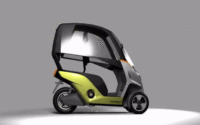Subsidies Help China to Become No.1 in Electric Vehicle Market
- China’s target for 2020:
According to Central Government of China, Electric Vehicle will reach over 30 Million Units by 2020 and over 35 Million by 2025.
The government of China is pushing Electric Vehicles sale to reduce pollution level in china, this is a part of new industrial policy known as Made in China 2025.
China is the largest market for plug-in vehicles globally. From January to June 2017, more than 1,81,000 units of plug-in passenger car were sold which includes imports as well.
In October 2017, to push electric vehicles sales and to reduce carbon emission, Beijing announced that soon there will be a ban on petrol and diesel vehicles. Due to which the sales of electric vehicles have grown so quickly.
To achieve the target of industrial policy, know as Made in China 2025, the local and the central government in China have dispensed subsidies worth up to Rmb100,000 ($15,000) per vehicle.
- The Plan of Promoting Vehicle Battery Industry Development in china
The plan was jointly released by the Ministers of the country to encourage the development and industrialisation of Lithium-ion battery industry and the formations of research and development centres. The action plan also inspires the foreign originalities to established their research and development centres in the country.
Request a Sample Report: https://www.techsciresearch.com/sample-report.aspx?cid=1359
- Vehicle Licensing System:
The government of china has also introduced vehicle licensing system in many cities, licence plates are provided to the consumer either by lottery system, auction or the consumer must pay high fees for preferred internal combustion engine vehicles. But for electric vehicles, the licence plate are given free of cost and without waiting period. This is boosting the sales of electric vehicles in the country.
- Global leader in Electric Two-wheelers
In electric two-wheeler market china is the leader worldwide. There is a restriction on the use of conventional two-wheelers in the country to reduce the pollution level. The consumers also enjoy cost benefits, as the two-wheelers cost less than 500 USD.
In 2015, China overtook the United States electric vehicle market with over 2,00,000 new registrations.
- Electric Vehicle Purchase Incentives:
The Electric cars in China enjoys the exemption from any tax. The value of the incentives was in the range of 35 000 Yuan renminbi (CNY) to CNY 60 000 (USD 6 000 to USD 10 000) to purchase electric cars (Lutsey, 2015). Electric vehicles are exempted from ownership taxes as well.
According to China Association of Association of Automobiles Manufacturers, in August 2017, the production and sales of electric vehicles reached 72 thousand units and 68 thousand units respectively.
Source: CAAM
In April 2017, the China’s Ministry of Industry and Information Technology mentioned that vehicle manufacturers once again are eligible for subsidies which includes manufacturers like Zhengzhou Nissan Automobile Co, SAIC Tangshan Car Ltd, the Sino-Japanese joint venture and China Youth Car Group. This is helping electric vehicle manufacturers to increase their production capacity in the country which is further booming the China’s electric vehicle market.

Did you know, United States is not even close to China’s EV Sales?

According to International Energy Association (IEA), in 2016, China registered more than 3,50,000 new electric vehicles while in United States only recorded registrations of around 1,59,000. United States is nowhere closer to China’s Electric Vehicle market.
China Electric Vehicle Market is expected to grow at a CAGR of over 30% during the forecast period on the back of easy licencing, incentives provided by state and central government and advance technology. Moreover, many companies are investing in China to set up the manufacturing units of electric vehicles and operating joint ventures to cater to the domestic market.
In 2017, BMW in joint venture with Brilliance China Automotive Holding opened an electric vehicle battery plant in Shenyang. BMW plans by 2025, to achieve 15 to 20 percent market share in electric vehicle market.
In April 2017, the China’s Automobile Mid and Long Development Program was released by the government to develop a strong auto power over next ten years in China. The program aims to develop the market for electric vehicles and connected cars.
China is opening free trade zones for foreign auto manufacturers:
The government of China is discussing about a plan for manufacturers to set up their wholly owned manufacturing units in its free trade zone. Tesla Inc. has been given the opportunity by the government to start its fully owned manufacturing operations in the country.
Ford Motor Co. is also exploring to set up a joint venture with Anhui Zotye Automobile Co. to produce electric vehicles in China.
Volkswagen AG has already partnered with Anhui Jianghuai Automobile Group Corp. to manufacture electric vehicles in the country.
Some of the major players operating in China Electric Vehicle Market are BYD, BAIC, Geely, Yutong, Wuzhoulong, FDG, Zotye, Jiangsu xinri e-vehicle co., ltd., Yadea Technology Group, Zhejiang Luyuan Electric Vehicle etc.
Conclusion: China Electric Vehicle Market is expected to grow at a CAGR of over 30% over the next five years on the back of easy licencing, incentives provided by state and central government and advance technology. Moreover, many companies are investing in China to set up the manufacturing units of electric vehicles and operating joint ventures to cater to the domestic market. Chinese OEM’s achieved a 40 percent global share in 2015 in EV production globally and in 2016, the country produces over 3,00,000 EV’s and now the country has largest number of EV’s on its road and is expected to maintain its dominance during the forecast period as well.



